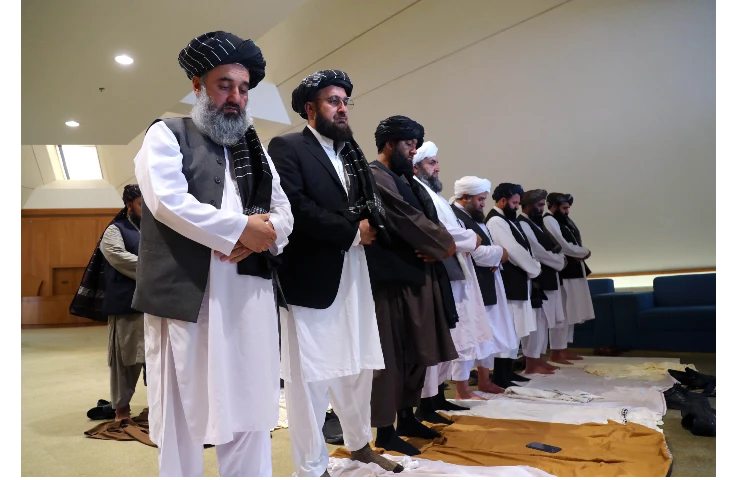

File photo of the Taliban delegation praying before signing the Doha accord with the US in Qatar in 2020 (Photo: ANI/Reuters)
Soon after US CENTCOM Commander General Michael Erik Kurilla visited Pakistani Army headquarters in Rawalpindi, Washington is now sending Special Representative for Afghanistan, Thomas West, and Special Envoy for Afghan Women, Girls, and Human Rights, Rina Amiri, to Doha, Qatar, to talk to the Taliban.
In a statement, the US Department of State said: “In Doha, they will meet with a delegation of Taliban representatives and technocratic professionals from key Afghan ministries to discuss critical interests in Afghanistan. Priority issues will include humanitarian support for the people of Afghanistan, economic stabilization, fair and dignified treatment of all Afghans, including women and girls, security issues, and efforts to counter narcotics production and trafficking”.
The US-Taliban talks in Doha has fired speculation that the US is trying to give recognition to the Taliban regime which has not been accepted by governments as yet. However, US State Department spokesperson Vedant Patel clarified in a briefing that the US-Taliban talks do not represent a change in the US stance towards the Taliban administration.
In a press briefing on Wednesday, Patel said that the meetings do not, “mean any kind of indication of recognition or any kind of indication of normalization or legitimacy of the Taliban… This does not indicate any change in the policy of the United States. We have been very clear that we will engage with the Taliban appropriately when it is in our interest to do so”.
Besides the talks in Qatar – which was the architect of the US-Taliban talks during the Donald Trump presidency in 2020 leading to the US withdrawal, the two envoys – West and Amiri, will also travel to Astana, Kazakhstan, to hold talks with Central Asian Republics (CAR) about the situation in Afghanistan. Of the five Central Asian nations, three share their southern borders with Afghanistan and have often expressed fears that the Taliban rule may spread radicalisation in the region.
The US statement said: “While in Astana, they will meet with colleagues from Kazakhstan, the Kyrgyz Republic, Tajikistan, Turkmenistan, and Uzbekistan for a C5+1 Special Session on Afghanistan. They will also meet with civil society members focused on advancing women’s economic empowerment in Afghanistan and Kazakhstan”.
The US, along with its NATO allies had vacated Afghanistan on 30 August 2021 leaving behind the war-torn country in dire straits. The Taliban seized power on August 15 amid a power vaccume, large-scale violence and complete collapse of the Ashraf Ghani government. Ghani himself flew to Dubai just as the Taliban gunmen were entering Kabul.
By focusing on women’s rights in Afghanistan, the status of minorities, education for girls and the deteriorating situation of human rights in the country, the US is seen as making efforts to come back to the Af-Pak region where China has been establishing a strong economic footprint gradually.
The US, along with Pakistan – its ally from the war on terror, is concerned that Afghanistan is becoming a sanctuary for various terror groups once again. Earlier this week, the US Secretary of State, Antony Blinken had met Pakistani Foreign Minister Bilawal Bhutto-Zardari to discuss stabilising the Pakistani economy as well as Afghanistan.
The US appears desperate to get back to Af-Pak not only because of China, but also because Russia appears to be returning to the Hindukush riding on the Taliban bandwagon. Besides, the US is also keen to tap into Afghanistan’s vast natural resources including Lithium, the feedstock for the electric vehicle revolution.
There are telling signs that Washington once again seems to be relying on Pakistan to re-enter Afghanistan, especially after the exit of former Prime Minister Imran Khan, who had been visibly bonding with China and had opened a new channel with the Russian by visiting Moscow.
Unwilling to see Washington’s return to Kabul via Islamabad, the Taliban has already bugled against attempts by US to rework its equation with the Taliban.
The government in Kabul has clearly refuted Islamabad’s accusations that there is no TTP in Afghanistan. It has also blamed Pakistan for its own failure in maintaining internal law and order. On the other hand, the TTP spokesperson has said that their struggle in Pakistan is being maintained by Pakistani Muslims who are motivated by jihad and the need to introduce sharia in Pakistan.
Prime Minister Narendra Modi addressed the G7 Outreach Session on the theme 'Energy Security: diversification,…
Prime Minister Narendra Modi held a telephonic conversation with US President Donald Trump on the…
The launch of Axiom Mission 4, the fourth private astronaut mission to the International Space…
The Embassy of Iran in India on Wednesday shared a statement made by the Director-General…
India and Canada agreed to resume full diplomatic services, ending the thaw between the two…
Prime Minister Narendra Modi held a bilateral meeting with his Canadian counterpart Mark Carney on…